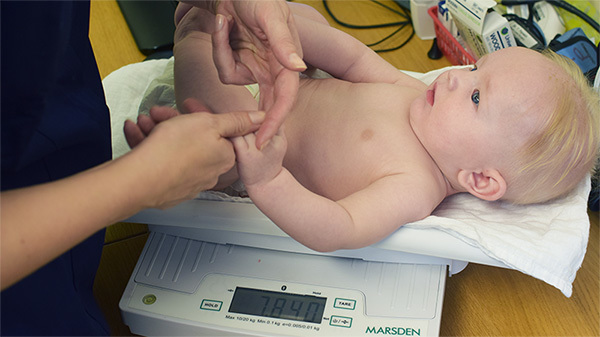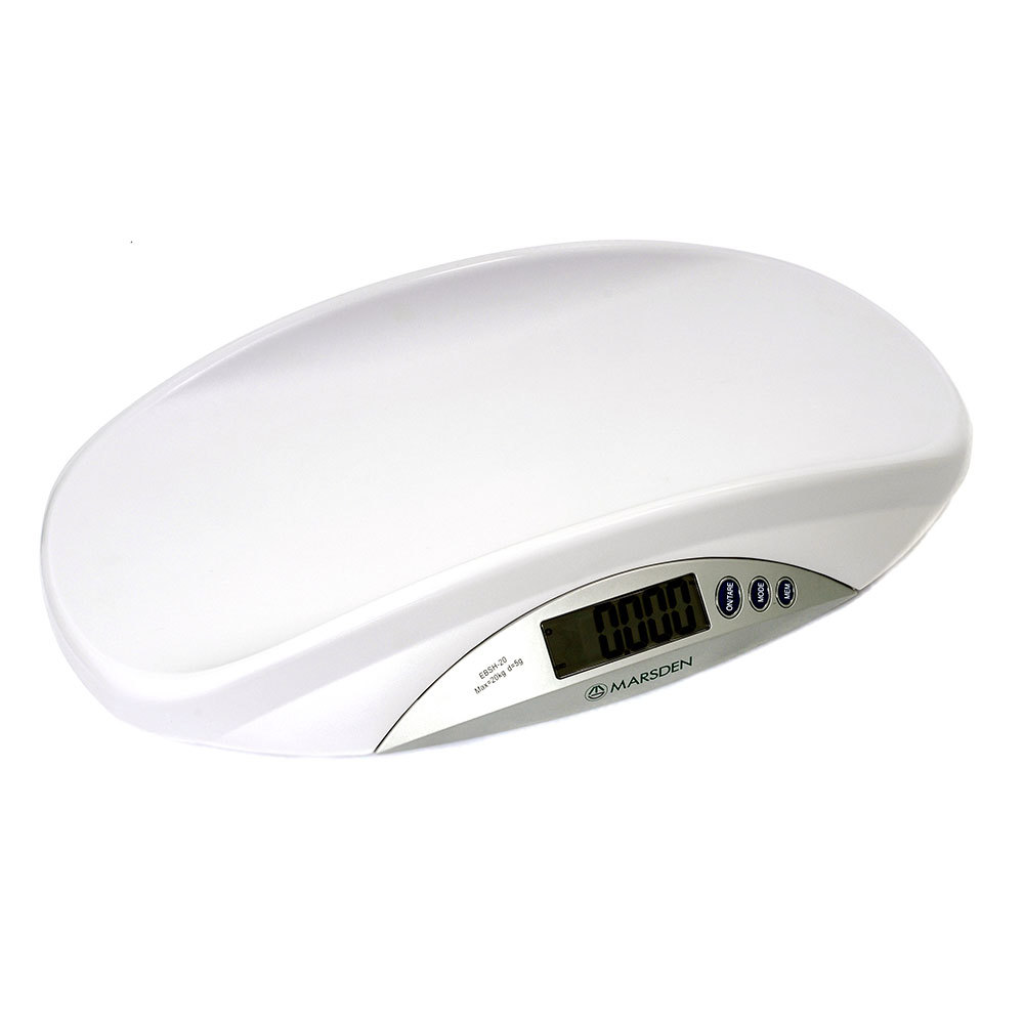Should I Weigh My Baby At Home?

Pictured Above: Marsden M-410 Baby/Toddler Scale.
In one of our previous blog posts, we discussed how weighing your baby is essential for a number of reasons. It’s done to monitor your baby’s growth, to work out if they’re consuming enough breastmilk, and to give parents some peace of mind.
Did you know that not gaining weight properly can be an indicator for multiple baby health issues?
That’s why it's recommended that you weigh your baby once a month, although health and doctor visits aren’t offered this often.
In this situation it could be a good idea to purchase a baby scale for home use.
Why Should You Weigh your Baby Often?
We going into this in more depth in this blog post, but to summarise we’ve listed the 3 key points below:
To Monitor Growth
Weighing your baby often can help to ensure they are growing at the correct rate by comparing it with a growth chart. The Royal College of Paediatrics and Child Health have released one for boys and one for girls, which can be found here.
If your child isn’t growing at the correct rate this can be a hint at a number of health issuers, which we will discuss in a later point.
Some parents also just like to know their baby’s weight for filling in scrapbooks and memory books, or even for when other people ask. It can be embarrassing when you don’t know, so knowing your baby’s weight week by week can be beneficial for that reason too.
To Ensure Your Baby is Eating Enough
You should be feeding your baby little and often. They can’t handle large amounts of food because of how small their stomachs are.
It can be difficult to work out how much breastmilk your baby is getting, however. During the first few weeks it’s hard for the baby to learn how to latch on properly and to know whether the mother is producing adequate milk.
Tracking the baby’s weight will help to check if they are feeding properly or not. We go into this more in this blog post, but basically all you need to do is weigh your baby before and after their feed to ensure they have eaten enough.
To Check for Health Issues
If your baby is faltering, or not growing as fast as expected, this can be for a number of reasons. The most important thing is not to panic and to contact your GP for their evaluation on the situation.
In addition to smaller issues, such as having trouble latching on, infrequent breastfeeding sessions, sessions that are too short and burning too many calories, sometimes a lack of growth can be indicating other health issues.
For example, jaundice can make babies very sleepy and not interested in breastfeeding. While internal issues such as celiac disease, food allergies and diarrhea can also affect a baby’s growth.
Neurological conditions such as down syndrome can affect a baby’s learning and prevent them from latching and nursing properly.
Breathing difficulties and heart diseases can also cause a baby to burn more calories than normal which can result in them failing to grow.
How Can I Weigh My Baby At Home?
Using a Specialised Baby Scale

The easiest way to weigh your baby is using a specialised baby scale, such as the Marsden BAS-200 Baby Scale, pictured above.
These scales are usually smaller than your average bathroom scale, and much more precise. Sometimes they also have ergonomic features to make it more comfortable for you baby.
They also have useful functions, such as Tare, which are designed to make baby weighing easier. If you have a blanket for your baby, you can put that on first and remove the weight using Tare. This means your baby will be comfortable, while your scale won’t be including the extra weight when displaying your baby’s weight.
Using a Kitchen Scale
If you don’t have a proper baby scale, we suggest using a kitchen scale instead. These are usually smaller and more precise than bathrooms scales.
When weighing babies precision is vital. We’ve seen a few posts where people have commented that their scales are a couple of ounces off, but that can be half of your baby’s weight gain for that week.
Kitchen scales are also smaller and perfect for fitting babies on. Many of them also have a tare function, like baby scales, which can be used to remove unnecessary weight such as a bowl.
Using a Bathroom Scale
As a last resort you can also use a bathroom scale.
Many people do this to save on the cost of purchasing a new scale, but bathroom scales aren’t renowned for being reliable. In fact they’re rather unreliable, which isn’t what you want for weighing your newborn.
They usually aren’t precise enough either. Some can be out by as much as 3kg, which isn’t great when weighing babies. They usually also require someone to stand on the scale with the baby, as the minimum weight may not be high enough.
Baby Scales for Home Weighing
We have a number of suitable home baby scales, which are perfect for monitoring your baby’s weight between appointments.
BAS-100HM Baby Scale with Height Measure
This lightweight, portable baby scale is ideal for home use. It comes with a 20kg capacity and is accurate to 5g. It also includes a 70cm height measure (1mm increments) to measure your baby’s height.
BAS-200 Baby Scale
This scale is just as accurate as the BAS-100HM, but is slightly cheaper due to the lack of height measure. It’s features include tare and even memory recall to make the weigh process easier.
BAS-250 Baby Scale
For ultimate accuracy when weighing even the smallest babies, choose this scale. Its 2g graduations means it will show you the smallest changes in a baby’s weight, making it perfect for monitoring breastmilk intake.
M-400 Class III Approved Baby Scale
If you intend to monitor your child’s weight over the long term, then choose the M-400. With a 20kg capacity, this scale can measure your child’s weight into their teenage years. The tray is removable so that young children can stand on the flat scale.
Plus this scale is Class III Approved, which means it’s suitable for use in medical settings. Therefore you know it’s accurate and that you can count on it to be reliable every time you use it.
Watch this video to see 6 reasons why you should choose this scale.
Related Articles
Further Reading
Have you ever wondered why baby birth weights vary so much? This blog post tells you 10 factors that affect a baby’s birth weight.
First-time parents are often surprised by just how often their newborns need to feel. Use this breastfeeding guide to work out how often your baby should be feeding and answer many other breastfeeding related questions.
A drop in weight can be attributed to a number of things, but insufficient milk intake is the simplest explanation. Eliminate concern by measuring your breast milk to ensure your baby is drinking enough.